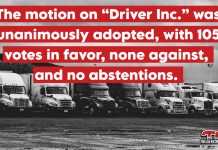The tariffs imposed by the United States on Canadian imports are shaking up trade dynamics and the trucking industry.
With a 25% duty on most Canadian exports—and a 10% tariff on energy products starting February 4—this decision by President Donald Trump has sparked strong reactions on both sides of the border. In response, Canada has implemented equivalent countermeasures targeting several American products.
This economic standoff is poised to have significant consequences for the trucking industry, a sector already strained by rising costs and declining revenues.
Tariffs: National Security Pretext or Economic Leverage?
“The goal of tariffs is to increase U.S. industrial capacity, create and protect U.S. jobs, and to protect our national security by ensuring our supply chains, particularly for our military, are not reliant on our adversaries,” Donald Trump testified before the Senate Committee on Finance in mid-january. “I believe that tariffs can be an important source of government revenue and can help fund investments that benefit American families, workers and companies.”
Trump further added that tariffs would be implemented alongside other economic policies, including regulatory relief and income tax adjustments, and that these tariffs would target “the appropriate range of jurisdictions and products, with rates calibrated to advance American interests.”
A Severe Economic Impact on Trucking
Trucking is central to trade between Canada and the United States. Annually, nearly $700 billion worth of goods cross the border, with half of that transported by truck. These new tariffs threaten to significantly slow down cross-border commerce, reducing the volume of goods transported and increasing operational costs for carriers. According to the Canadian Trucking Alliance (CTA), this situation could directly affect 120,000 drivers and companies engaged in cross-border deliveries.
An Industry Already Under Pressure
The trucking sector has been grappling with increasing operational costs. Rising fuel prices, higher maintenance expenses, and a persistent labor shortage have already weakened many companies. With the new tariffs, the cost of equipment and parts imported from the U.S. could skyrocket, making it even harder for trucking fleets to remain profitable. Additionally, carriers may see their profit margins shrink, not only if their clients choose to import fewer American goods but also if the added costs from these tariffs are shared between shippers and carriers on both sides of the border, each trying to avoid bearing the full burden.
Industry Leaders Push Back Against Tariffs
Trucking associations in both the U.S. and Canada are speaking out against these tariffs, calling them excessive and unjustified. Stephen Laskowski, president of the CTA, described these measures as “disproportionate and harmful to businesses in both countries.” On the American side, the American Trucking Associations (ATA) expressed concerns that this trade war could hinder the sector’s recovery, which is already struggling due to economic challenges. ATA President Chris Spear warned that these tariffs could reduce transportation demand and increase costs for carriers, impacting the entire logistics chain across North America.
Nationwide Boycotts of American Products
Across Canada, the response to U.S. tariffs has been swift and widespread. In Quebec, many citizens called for a boycott of American products to protest these protectionist measures. At the urging of the provincial government, the Société des alcools du Québec (SAQ) announced it would remove American wines from its shelves, demonstrating a clear preference for local products. Similarly, in Ontario and other provinces, state-run liquor stores have pulled American alcoholic beverages from their offerings. These initiatives, coupled with national campaigns encouraging consumers to buy local, send a strong message against U.S. tariffs. However, these movements could also have unintended side effects, particularly for retailers and businesses that rely on imported goods, including their transportation.
A Threat to Supply Chains
The disruptions caused by these tariffs could ripple far beyond the transport sector. Canadian companies that depend on raw materials or finished goods imported from the U.S. may face higher costs and longer delays. Distributors and manufacturers must quickly adjust their sourcing strategies to prevent a broader crisis. Some experts even recommend strengthening interprovincial trade to reduce reliance on American imports.
Mitigation Measures Needed
In response to this economic uncertainty, the Canadian government has introduced support measures to help affected businesses. These include financing programs and incentives to diversify export markets. Furthermore, several experts suggest that transportation companies should revise their routes and explore new opportunities, particularly by strengthening commercial ties with Europe and Asia.
An Uncertain Future for Trucking
As this trade war escalates, the trucking sector must quickly adapt to the new market realities. If tensions persist, transport companies will need to innovate and diversify their strategies to minimize losses. In the meantime, consumers, businesses, and governments must make strategic decisions to mitigate the impact of these tariffs and ensure the country’s economic stability.
















